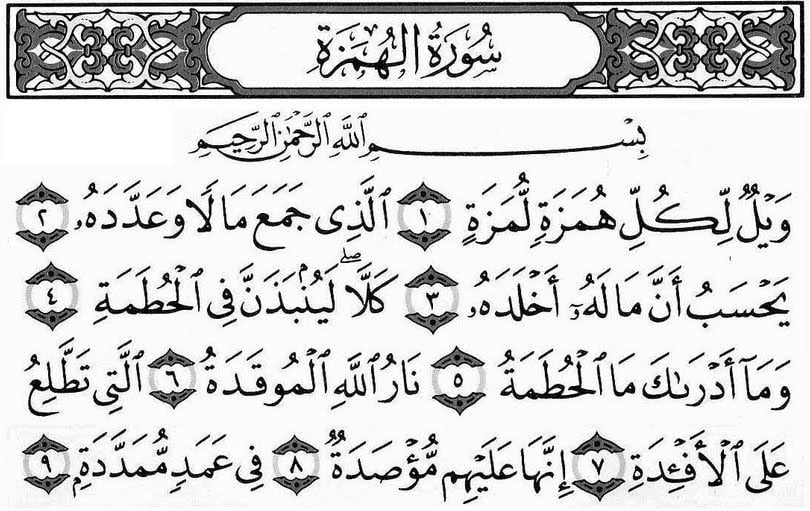
The short yet powerful Surah Al Humazah of the Holy Quran. With only nine verses, the message is plain and strong. It cautions against vices, including gossiping, backbiting, mocking others, being overly proud, and hoarding wealth.
And, in contemporary society, where people chase’ money, pass judgment on others, and exploit social media to make fun of others, the teachings of this Surah are more relevant than at any other time. This blog post will explore what Surah Al-Humazah teaches us, how we can apply its lessons to our lives in the United States, and how it relates to broader Islamic principles.
What is Surah Al-Humazah?
Al-Humazah is the 104th chapter of the Qur’an. It was disclosed in Makkah; therefore, it is a Makki Surah. That means it fell at a time when early Islam was heavily contravened against, when Prophet Muhammad (peace be upon him) and his followers sat on shaky ground.
It speaks about those who ridicule, gossip, hoard wealth for themselves, and believe their riches make them superior to others. And it concludes with words of warning: these people will be sternly punished in the Hereafter.
Only a few lines in length, but this Surah conveys a significant spiritual message about what we say, our arrogance, and our love for wealth.
Arabic Verses with English Translation
Here are the verses of Surah Al-Humazah in Arabic with a simple English translation:
1. Woe to every slanderer and backbiter.
2. Who collects wealth and continuously counts it?
3. He thinks that his wealth will make him live forever.
4. No! He will surely be thrown into the Crusher.
5. And what can make you know what the Crusher is?
6. It is the fire of Allah, kindled forever.
7. Which rises over the heart.
8. Indeed, it will close in on them.
9. In extended columns.
Word-to-Word Explanation (in Simplified Language)
Woe (Wayl) A word which implies a dreadful warning. This is not just sadness, it’s a harbinger of real trouble to come.
Slanderer and Backbiter: These are those who backbite and spread rumors. A slanderer does it publicly and wilfully, a backbiter snidely or indirectly.
Collects Wealth: These are individuals who pursue wealth and continually accumulate it without utilizing it for a beneficial purpose.
Counts It: Someone who won’t stop checking their phone or bragging about how much money they have. Cadams “If you find a man checking his phone for a text or email, or who is constantly talking about how much money he makes, he counts it.
Crusher (Hutamah): This is a name of Hellfire which crushes the skull and the heart. It’s a pain in the soul, not just the body, and it’s not good for us.
Fire of Allah? This is no ordinary fire; this is Allah-made fire that is fiercer than anything on earth.
Closed In: That is, it means you can’t get away from it. But once someone is inside, the punishment will never end.
Fire of Thine anger that burns deep and long In the inmost depths of the sinner.
What We Learn from Surah Al-Humazah?
Our Words Have Power
In Islam, to speak kindly and not say harmful things is a big part of the deen. Making fun of someone, even in jest, can deeply wound their feelings. The Surah is a demonstration of how words can be as harmful as deeds.
Even in the United States, bullying in schools, workplaces and online is a major problem. Surah Al-Humazah reminds us to speak well to people and refrain from backbiting.
Wealth Is a Test, Not an Entitlement
This Surah also mentions the people who store up wealth. These people aren’t sharing or giving to the poor. Because their bank balance makes them think they are powerful and nothing can ever happen to them.
Islam says wealth is a blessing, but it’s a test.” If you use it for yourself and forget others, it becomes a weapon of punishment.
In the United States, our success and financial well-being are closely intertwined. This Surah provides a balance in our thinking: work hard, but also give generously and remain humble.
Arrogance Leads to Loss
This Surah has pride as its central theme. It cautions against thinking that you are superior to others because of your job, car, clothes, or wealth. Pride divides relationships and builds walls.
In Islamic teachings and psychology, humility is associated with greater mental health, more meaningful relationships, and deeper contentment.
Accountability is Real
This Surah also powerfully teaches the principle that every act comes to bear. Even if a man escapes with his life in this world, he cannot evade the prison of the world to come.
The “Crusher” can be characterized as a punishment that not only wounds the body, but also crushes the heart, where emotions, pride , and intentions reside.
Tying the Lesson of Surah Al-Humazah to the Modern Age
We live in a world of digital gossip that moves at internet speed. A reputation can be rui ned by one social media post. Harassment for appearances, income, and beliefs is all depressingly common online.
Surah Al-Humazah makes us think twice before we speak, write, or share something. It teaches that true worth is a matter of character, not appearance.
At the same time, the love of money is intensifying. Some work around the clock so they can have more. However, this Surah reminds us that money will not accompany us to the grave — our deeds will.
Practical Application of Surah Al-Humazah
Think before you speak. Is it kind? Is it true? Is it necessary?
Avoid gossip. Face-to-face or online, don’t spread rumors.
Share your blessings. Donate money to charity regularly — even if in small increments.
Stay humble. “To succeed is one thing, to be successful is another. Success is a gift, not a reason to think you are better than everyone else.
Teach your kids. Find simple stories to impart these values to the next generation.
Conclusion
Surah Al-Humazah is short; it doesn’t take long to read, but it is inevitable and lasting in its message. It teaches us to respect others, stay humble, and use what we’ve been given in the right way. It cautions against gossip, pride, and greed that are prevalent today.
Whether you are American or from elsewhere, these lessons help forge better communities, kinder families, and more steadfast hearts. When we adhere to the lessons in Surah Al-Humazah, we protect our future in the Hereafter, and we preserve our character and our peace of mind in this life.
FAQs
What does Surah Al-Humazah mean?
The Surah cautions against mocking others, gossiping about a person to someone else, accumulating wealth solely for oneself, and believing that money can save you on that particular day. It also emphasizes the values of good character and modesty.
To whom was Surah Al-Humazah revealed?
Though it is not mentioned by name, the verse could be a revelation about rich folk in Makkah who made fun of the Prophet and his followers. But its message extends to us all.
What is “Hutamah” in surah Al_Humazah?
“Hutamah” is a name for Hell. It’s a term that means “the Crusher,” and it refers to the fire that doesn’t just burn, but that crushes and destroys all the way.
How do we teach this surah to our children?
Utilize simple stories and examples, such as not teasing friends, not speaking ill of others behind their backs, and being kind and helpful. Teach them why good speech and sharing are important.
Is having wealth in Islam bad?
No, wealth is not wrong. However, being greedy, selfish, and arrogant about it is. Islam is about making money, says Gray, who is attractive at age 23 and a former University of California football player.
